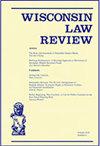What Federal Gun Control Can Teach Us About the Dmca's Anti-Trafficking Provisions
IF 0.7
4区 社会学
Q2 LAW
引用次数: 4
Abstract
This article studies the so-called "anti-trafficking provisions" of the Digital Millennium Copyright Act ("DMCA") by drawing insight from federal gun control. Among other things, the anti-trafficking provisions criminalize the distribution of technology that circumvents the encryption schemes sometimes used to protect digital files. This prohibition even applies to the sale of circumvention technology for lawful purposes. Not suprisingly, this result has generated controversy. Consumer advocates and civil libertarians have argued that it is wrong to criminalize the sale of technology that has lawful use, particularly when that criminalization makes it difficult - if not impossible - for the public to make legal, noninfringing use of copyrighted works. Controversy exists because Congress has refused to amend the DMCA to preserve lawful consumer use of copyrighted works. The argument for this refusal is simple: Digital technology, particularly the Internet, unacceptably threatens the security of copyright. Strong measures must therefore be taken to prevent such misuse of digital technology, even if it means curtailing rights of access and use that the public is supposed to enjoy.The article questions whether the above described sacrifice of public rights is really necessary. This criticism starts with the observation that both federal gun control and the DMCA's anti-trafficking provisions respond to the misuse of technology. People misuse guns to commit crimes, and people misuse circumvention technology to commit copyright infringement. In both cases, Congress has used criminal law to keep technology away from those who might misuse it. In the case of circumvention technology, Congress has banned such technology at the expense of public of access to such technology for lawful purposes. In the case of guns, Congress has not imposed a ban precisely because it was concerned about preserving access to firearms for lawful purposes.The article uses this observation to challenge the view that public availability of circumvention technology will destroy copyright. The article studies the regulatory methods used in gun control, and adapts them to propose a general approach for controlling the misuse of circumvention technology while preserving access to such technology for lawful purposes. The article contends that this proposal will provide adequate security to copyright holders, preserve public rights of fair use and access to copyrighted works, and encourage the responsible use of digital encryption schemes.联邦枪支管制可以教会我们关于Dmca的反贩运条款
本文以联邦枪支管制为例,对《数字千年版权法案》(DMCA)中所谓的“反贩运条款”进行了研究。除其他事项外,反贩运条款将传播绕过有时用于保护数字文件的加密方案的技术定为刑事犯罪。这一禁令甚至适用于出于合法目的出售规避技术。不出所料,这一结果引发了争议。消费者权益倡导者和公民自由主义者认为,将合法使用的技术销售定为刑事犯罪是错误的,特别是当这种刑事犯罪使得公众很难(如果不是不可能的话)合法地、不侵犯地使用受版权保护的作品时。争议之所以存在,是因为国会拒绝修改DMCA以保护消费者合法使用受版权保护的作品。这种拒绝的理由很简单:数字技术,尤其是互联网,对版权安全的威胁是不可接受的。因此,必须采取强有力的措施来防止这种对数字技术的滥用,即使这意味着限制公众应该享有的访问和使用权利。文章质疑上述公共权利的牺牲是否真的有必要。这种批评始于联邦枪支管制和DMCA反贩运条款对技术滥用的回应。人们滥用枪支犯罪,人们滥用规避技术侵犯版权。在这两种情况下,国会都使用了刑法,使技术远离那些可能滥用它的人。在规避技术的情况下,国会以牺牲公众出于合法目的获取此类技术为代价,禁止了此类技术。就枪支而言,国会之所以没有颁布禁令,正是因为它担心为合法目的保留获取枪支的机会。本文利用这一观察来挑战公众获得规避技术将破坏版权的观点。本文研究了枪支管制中使用的监管方法,并对其进行了调整,提出了一种控制滥用规避技术的一般方法,同时保留了出于合法目的使用此类技术的机会。文章认为,该建议将为版权持有人提供足够的保障,维护公众合理使用和获取版权作品的权利,并鼓励负责任地使用数字加密方案。
本文章由计算机程序翻译,如有差异,请以英文原文为准。
求助全文
约1分钟内获得全文
求助全文
来源期刊

Wisconsin Law Review
Social Sciences-Law
CiteScore
1.00
自引率
16.70%
发文量
0
期刊介绍:
The Wisconsin Law Review is a student-run journal of legal analysis and commentary that is used by professors, judges, practitioners, and others researching contemporary legal topics. The Wisconsin Law Review, which is published six times each year, includes professional and student articles, with content spanning local, state, national, and international topics. In addition to publishing the print journal, the Wisconsin Law Review publishes the Wisconsin Law Review Forward and sponsors an annual symposium at which leading scholars debate a significant issue in contemporary law.
 求助内容:
求助内容: 应助结果提醒方式:
应助结果提醒方式:


